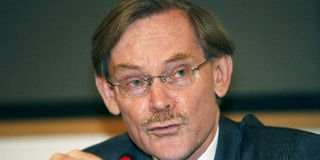Kenya to get Sh6.4bn from World Bank

World Bank President Robert Zoellick. Photo/REUTERS
What you need to know:
- Bank approves $253 million for corridor project
- Also unveils $80 million to boost energy sector
The World Bank approved $253 million in funding on Friday to help Kenya upgrade a crucial but pot-holed highway connecting its capital with neighbouring Uganda and much of central Africa.
The move increases the Bank's support for the Northern Corridor Transport Improvement Project (NCTIP) to $460 million. Initial financing of $207 million for the scheme was agreed by the Bank's Executive Board in June 2004.
"These extra resources will enable Kenya to rehabilitate key sections of the northern road corridor between Nairobi and the Ugandan border," Johannes Zutt, the Bank's country director for Kenya, said in a statement.
"This road is not just important for western Kenya, but is also a vital trade link for neighbouring landlocked countries, including Uganda, Rwanda, Burundi, the eastern Democratic Republic of Congo and southern Sudan."
Kenya is east Africa's biggest economy and an important business and transport hub for a big chunk of the continent.
But the country's rapid economic growth over the last five years has caused traffic congestion in cities and severe bottlenecks along the northern corridor that have delayed goods and raised the cost of doing business across the whole region.
Destruction of parts of the transport system during last year's Kenyan post-election crisis worsened these problems.
Money for energy
The whole project will cost $960 million, to be funded by Kenya's government and the Bank.
Other donors including the European Investment Bank, the Nordic Development Fund and the French Development Agency are also providing co-financing.
The Bank said the extra funds were being provided on the standard terms of the International Development Association (IDA), its concessionary lending arm, with a 40-year maturity period including a 10-year grace period.
Separately, it said it had approved an additional $80 million to help Kenya develop its energy sector by improving electricity distribution to less well-off regions.
Only about 18 per cent of Kenyans have electricity in their homes and in rural areas that figure plunges to just 3 per cent. The extra money will go to projects in Western and Coast Provinces, which have the nation's highest poverty rates.
"Improving the supply and reliability of power is critical to improving private sector competitiveness and creating economic opportunities for Kenyans who are not presently connected," Patrick Nyoike, permanent secretary at the Energy Ministry, said in the statement.
The new energy sector funding adds to an earlier $80 million project signed off on by the Bank in July 2004, and is approved under the same IDA terms as the Northern Corridor financing.




